- Bernard Preston homepage
- Chickens
- Best Chick Food
Best chick food
Best chick food should not be expensive, nor need it be a time-consuming chore.
There is no doubt whatsoever in my mind that chickens prefer a wheat-based product to corn, certainly if it is GM. I am not a scientist, but that is my observation; given the choice they will choose bread over mealies, as we call them in South Africa.
Having said that I am about to get my first load of non-GM corn. I will do an update on the subject after that.
The vitally important nutrient called betaine in wheat may be the reason.
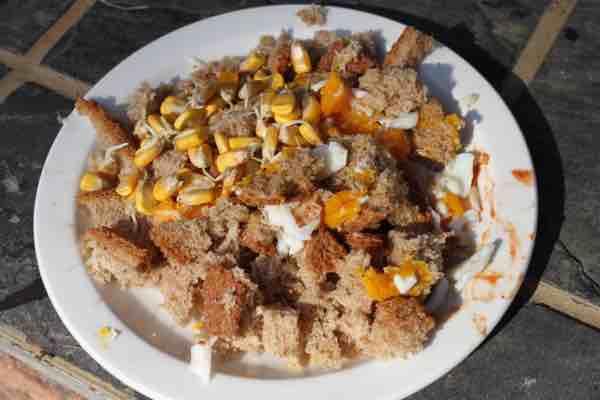
This page was last updated by Bernard Preston on 24th February, 2021.
The problem is getting wholesome full-grain bread with its full complement of betaine; that may be arduous for you but not for us as we bake it daily.
I prefer not to eat the supermarket loaf; mostly it is tasteless and highly-refined and not fit for consumption by humans or chicks.
I recommend you do the same and you will find plenty on this site about the ingredients needed to make a sourdough loaf; it takes only five-minutes each day.
- Bernard Preston homepage
- Chickens
- Best Chick Food
To the bread we add a chopped hard-boiled egg for our chicks; they absolutely love it.
The sprouted-corn you can see in the graphic above is for the hen and not her chicks. That is another topic all on its own.
To that homemade loaf, we add extra vegetable protein; the easiest for us is a couple of scoops of hummus, made from chickpeas. I prepare it several times a week anyway. The excess goes into our low GI bread.
So your chicks will have a ready carbohydrate source in the wholegrain bread, and three kinds of protein. There is one in the legume, another in the gluten and lastly from the egg.
Into the bread dough we add either butter or coconut oil, so they are getting essential fatty acids too; plus that in the wheatgerm.
Added to which of course the hen starts teaching her chicks to scratch when they are less than a week old; already they are supplementing the food we give them with microscopic creatures far too small for our eyes to see. If your birds are confined then you may need to add to this a ration from the seed-merchant.
Since our hens are free-range, within a few weeks they will be scratching amongst the cabbages and broccoli for yet more insects and grubs, adding their manure to the soil, and enriching the plants.
We do not let them near small seedlings; the mother will scratch them out in search of grubs and worms, particularly if you are using vermi-compost.
Best chick food
Best chick food can be made from nourishing whole-grain bread and a boiled egg plus access to the garden where they can scratch.
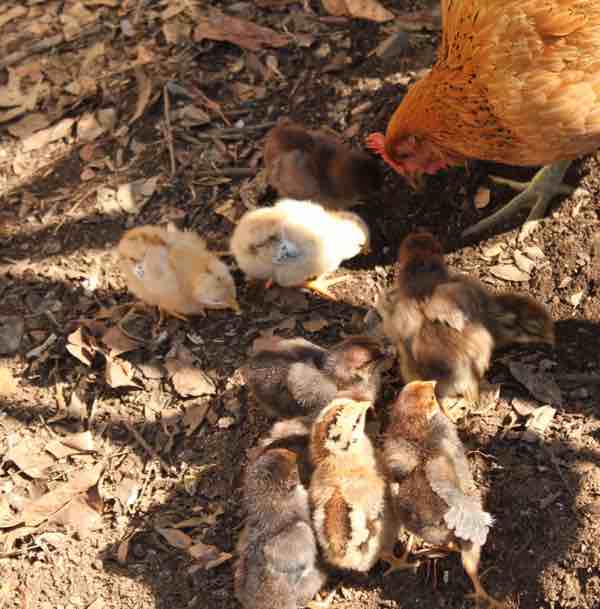
Over and above that, our hens get a shovelful of worms several times a week and sprouted corn daily; it came as a quite a surprise to me that the best chick food might include these creepy-crawlies. Even quite small babies will down one of the fetida.
Notice the synergy of green-living; we make hummus and bake our own bread, because we are passionate about nutritious, tasty nosh. It also makes the best chick food.
The wonder of worm farms is how powerfully they enrich the earth; getting your garden soil ready for the spring vegetables is so important. Simultaneously, both those greens and the helminths are providing better nutrition for the flock.
Increasingly scientists are pointing to our depleted soils as the cause of many of our chronic diseases. Hens, worms and the compost all contribute to vigorous plants for us to eat, replete with the necessary minerals and phytochemicals that both we and the chicks need.
Newsletter
Our newsletter is entitled "create a cyan zone" at your home, preserving both yourself and Mother Earth for future generations; and the family too, of course. We promise not to spam you with daily emails promoting various products. You may get an occasional nudge to buy one of my books.
Here are the back issues.
- Lifestyle and ideal body weight
- What are ultra-processed foods?
- Investing in long-term health
- Diseases from plastic exposure
- Intensive lifestyle management for obesity has limited value
- A world largely devoid of Parkinson's Disease
- The impact of friendly bacteria in the tum on the prevention of cancer
- There's a hole in the bucket
- Everyone is talking about weight loss drugs
- Pull the sweet tooth
- If you suffer from heartburn plant a susu
- Refined maize meal and stunting
- Should agriculture and industry get priority for water and electricity?
- Nature is calling
- Mill your own flour
- Bake your own sourdough bread
- Microplastics from our water
- Alternative types of water storage
- Wear your clothes out
- Comfort foods
- Create a bee-friendly environment
- Go to bed slightly hungry
- Keep bees
- Blue zone folk are religious
- Reduce plastic waste
- Family is important
- What can go in compost?
- Grow broad beans for longevity
- Harvest and store sunshine
- Blue zone exercise
- Harvest and store your rainwater
- Create a cyan zone at your home
The full cycle means growing those chicks into vigorous hens that will produce delicious eggs that are so different in both taste and appearance, not to mention nutrition, when compared to those from cages.
And the young cockerels, if you have the heart, make the most delicious, tender organic chickens you will find anywhere. That is another subject we will leave for now.
Perhaps you know that nearly one-third of the food grown for human consumption is never actually eaten; it is a sin. In the backyard permaculture home and garden all is devoured; nothing goes to waste from the potato peels to the last apple core. Since we are at the top of the food chain, the whole family benefits from chickens in the garden, as does the environment.
The next question of some importance is how many eggs?
I have worked on one egg per day for five or six chicks; that is a randomly chosen figure, and it has worked for us. Our little guys have flourished and produced beautiful, healthy adults.
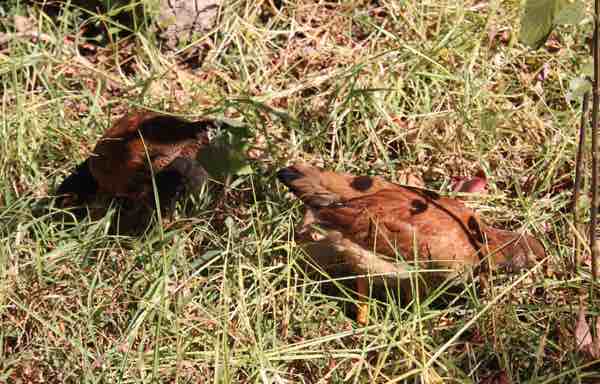
These are truly free range birds. They are now three-months old; best chick food has done them proud, with little of the expensive stuff from the feed companies.
Sprouting
Sprouting increases the nutrients from a seed, be it a grain like corn or a legume. Plus, perhaps because they've been softened, the chicks love them.
Whether the human concerns about anti-nutrients affects fowls is relevant, I doubt anyone would know for sure; perhaps so. Personally, I am not bothered after soaking, rinsing and sprouting, neither for ourselves nor our best chick food.
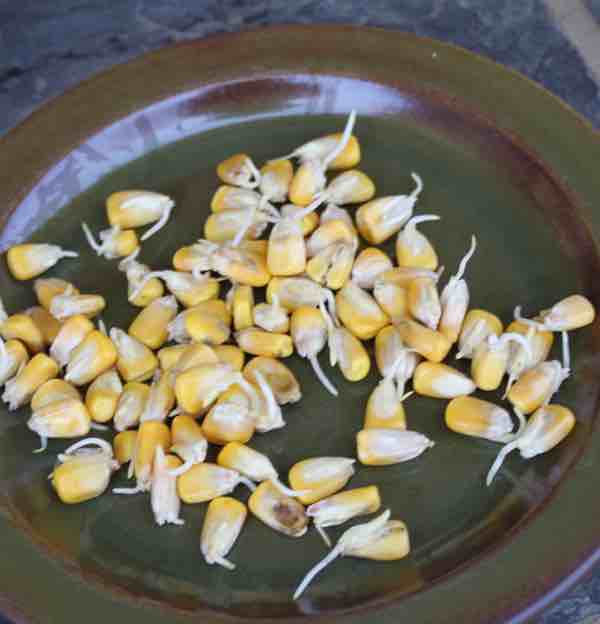
They too need plenty of protein; chickpeas are relatively expensive to use for birds, and we are looking at other possibilities. This spring I am going to see how they take to green broad-beans straight from the garden; should they be cooked or raw? If any of you have comments, I would appreciate your thoughts to contact.
It turned out to be too much work to give the chicks broad-beans.
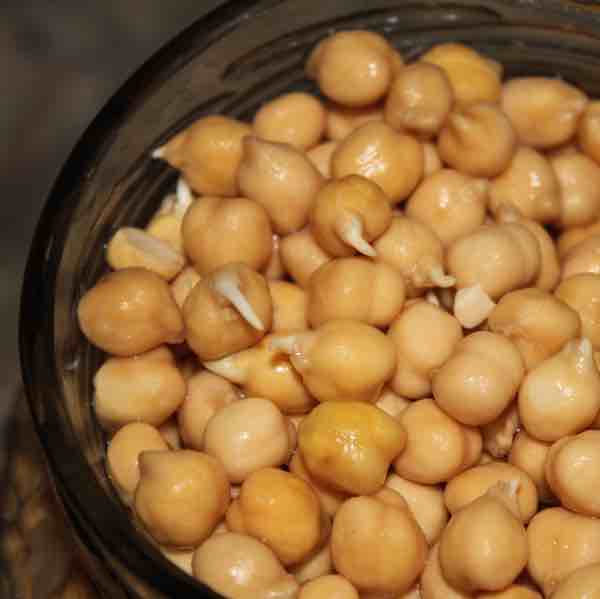
Wheat grains
We purchase 450 pounds of wheat from the farmer every year for our artisan bread; deliberately it is more than we need. I simply bring a couple cups to the boil in hot water, and leave it to steep for half an hour. The hens go crazy over it; they love it far more than corn.
"If you have a garden and a library, you have everything you will ever need."
- Marcus Cicero, Roman politician, lawyer and orator
Louis de Bernieres is my favourite author. Every writer must read too. The latest is Not-Withstanding, a series of gentle short stories set in a village in Surrey.
Some of his books though are so violent that I find it hard to recommend them; religious intolerance, war and forced relocation of whole communities are his favourite topics.
There is nothing glorious about war; it is all about dying in a savage manner, and de Bernieres wants to remind us what it is all about, often in graphic detail.
Did you find this page interesting? How about forwarding it to a friendly book or food junkie? Better still, a social media tick would help.
- Bernard Preston homepage
- Chickens
- Best Chick Food
Address:
56 Groenekloof Rd,
Hilton, KZN
South Africa
Website:
https://www.bernard-preston.com